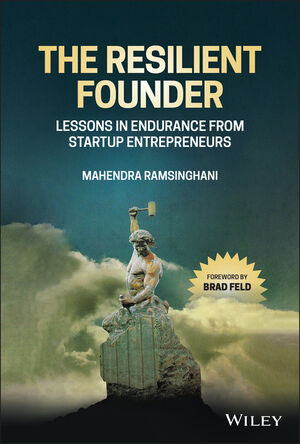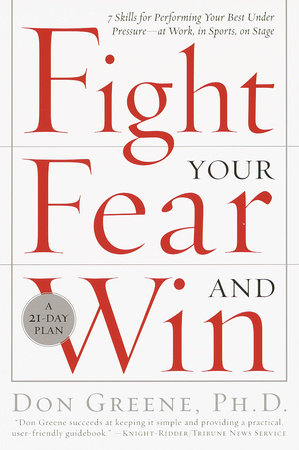Insecurity about doing things incorrectly causes many people to unconsciously sabotage their chances for success.
YOU MIGHT ALSO LIKE
CLEAR ALL
BY TOPIC
BY TEACHER
BY TYPE
FILTER

TOPIC
- Fear (77)
- Anxiety (55)
- Self-Mastery (54)
- Well-Being (51)
- Depression (47)
- Resilience (36)
- Neuroscience (35)
- Peak Performance (34)
- Honoring Emotion (32)
- Performance Pressure (32)
- Courage (31)
- Failure (31)
- Goal Setting (31)
- Self-Development (31)
- Self-Pressure (30)
- Mind-Body Connection (29)
- Motivation (28)
- Self-Discovery (27)
- Stress Management (26)
- Mindfulness (25)
- Illness and Injury (24)
- Habit Formation (23)
- Kids and Sports (23)
- Self-Care (23)
- Physical Health (22)
- Brain Health (21)
- Self-Reflection Practices (21)
- Stress (21)
- Addiction (20)
- Habits of Mind (20)
- Awareness (19)
- Parenting (19)
- Confidence (18)
- Negative Self-Talk (18)
- Chronic Anxiety (17)
- Gender Discrimination (17)
- Growth Mindset (17)
- Self-Healing (17)
- Self-Limiting Beliefs (17)
- Cancer (16)
- Diet and Nutrition (16)
- Eating Disorders (16)
- LGBTQIA Well-Being (16)
- Meditation (16)
- Women’s Well-Being (16)
- Criticism and Rejection (15)
- Emotional Intelligence (EQ) (15)
- Focus (15)
- Trauma Healing (15)
- ADD/ADHD (14)
- Anger (14)
- Clinical Depression (14)
- Empowerment (14)
- Memoir (14)
- Mental Health Challenges (14)
- Positive Self-Talk (14)
- Positive Thinking (14)
- Transformation (14)
- BIPOC Well-Being (13)
- Black Well-Being (13)
- Happiness (13)
- Relationship Challenges (13)
- Search for Purpose (13)
- Self-Esteem (13)
- Suicide (13)
- Authenticity (12)
- Communication Skills (12)
- Female Empowerment (12)
- Mindfulness Practices (12)
- Presence (12)
- Vulnerability (12)
- Child’s Emotional Growth (11)
- Endurance (11)
- Exercise (11)
- Human Potential (11)
- Leadership (11)
- Life Challenges (11)
- Mentoring (11)
- Shame (11)
- Activism/Service (10)
- Belonging (10)
- Competition (10)
- Entrepreneurship (10)
- Identity (10)
- Neuroplasticity (10)
- Performance Anxiety (10)
- Self-Acceptance (10)
- Self-Actualization (10)
- Self-Worth (10)
- Young Adult Well-Being (10)
- Addiction Recovery (9)
- Breathwork (9)
- Imagination and Creativity (9)
- Inner Peace (9)
- Inner Strengths (9)
- Letting Go (9)
- PTSD (9)
- Self-Compassion (9)
- Self-Control (9)
- Self-Reckoning (9)
- Anger Management (8)
- Body Image (8)
- Burnout (8)
- Discrimination (8)
- Grief (8)
- Intention (8)
- Joy (8)
- Psychology (8)
- Self-Realization (8)
- Sleep (8)
- Children’s Well-Being (7)
- Compassion (7)
- Conflict Resolution (7)
- Creative Well-Being (7)
- Decision Making (7)
- Finding Meaning (7)
- Homophobia (7)
- Positive Psychology (7)
- Racial Discrimination (7)
- Self-Reliance (7)
- Speaking Your Truth (7)
- Buddhism (6)
- Disconnection (6)
- Gratitude (6)
- Healthy Eating (6)
- LGBTQIA Sexuality (6)
- Neurodiversity (6)
- Self-Love (6)
- Setting Limits and Boundaries (6)
- Visualization (6)
- Willpower (6)
- Aging (5)
- Chronic Pain (5)
- Connection with Nature (5)
- Curiosity (5)
- Fellowship and Community (5)
- Integrative Medicine (5)
- Neuropsychology (5)
- Optimism (5)
- Plateauing (5)
- Racism (5)
- Social Justice (5)
- Social Responsibility (5)
- Soul Mission (5)
- Spiritual Growth (5)
- Spiritual Life (5)
- Spirituality and Health (5)
- Trauma (5)
- Trust (5)
- Unfulfilled Career (5)
- Veteran Well-Being (5)
- Work-Life Balance (5)
- Acceptance (4)
- Alcohol Addiction (4)
- Asking for Help (4)
- Cannabis/CBD (4)
- Child’s ADD/ADHD (4)
- Chronic Health Conditions (4)
- Community Healing (4)
- Connection (4)
- Domestic Abuse (4)
- Empathy (4)
- Faith (4)
- Family Dynamics (4)
- Forgiveness (4)
- Freedom (4)
- Guilt (4)
- Journaling (4)
- Kindness (4)
- Mindfulness Meditation (4)
- Panic Attacks (4)
- Passion (4)
- Perception (4)
- Relationship with Time (4)
- Spiritual Healing (4)
- Stoicism (4)
- Suffering (4)
- The Yips (4)
- Work Challenges (4)
- Yoga (4)
- Adaptability (3)
- Awe (3)
- Body Positivity (3)
- Building Character (3)
- Child’s Trauma (3)
- Cognitive Behavioral Therapy (3)
- Collaboration (3)
- Doubt (3)
- Drug Addiction (3)
- Dysfunctional Childhood (3)
- Facing Own Death (3)
- Forest Bathing (3)
- Generosity (3)
- Global Challenges (3)
- Healing Approaches (3)
- Holism (3)
- Hope (3)
- Imposter Syndrome (3)
- Integrity (3)
- Intuition (3)
- Life-Altering Injury (3)
- Living with Illness (3)
- Military to Civilian Re-entry (3)
- Offering Support to Others (3)
- Poverty/Economic Inequality (3)
- Racial Healing (3)
- Rest (3)
- Ritual (3)
- Romantic Relationships (3)
- Self-Discipline (3)
- Self-Expression (3)
- Situational Depression (3)
- Social Anxiety (3)
- Spiritual Awakening (3)
- Tibetan Buddhism (3)
- Transitions (3)
- Values (3)
- Women’s Rights (3)
- Abandonment (2)
- AIDS (2)
- Attachment Theory (2)
- Autoimmune Disease (2)
- Binge Eating (2)
- Biofeedback (2)
- Child’s Anxiety (2)
- Despair (2)
- Disabled Well-Being (2)
- Divorce and Breakup (2)
- Ego (2)
- Embodiment (2)
- Energy Healing (2)
- Genetics (2)
- Guided Meditation (2)
- Handling a Loved One’s Illness (2)
- Highly Sensitive People (2)
- Humility (2)
- Hypnosis (2)
- Inner Child (2)
- Inner Life (2)
- Interdependence (2)
- Intergenerational Trauma (2)
- Jealousy/Envy (2)
- Loneliness (2)
- Love (2)
- Male Friendship (2)
- Masculine/Feminine Dynamics (2)
- Memory (2)
- OCD (2)
- Othering (2)
- Philosophical Approaches (2)
- Physical Therapy (2)
- Pleasing Parents (2)
- Post-Traumatic Growth (2)
- Productivity (2)
- Race and Gender (2)
- Racial Identity (2)
- Racial Justice (2)
- Relationship with Money (2)
- Sexual Assault or Abuse (2)
- Sexuality (2)
- Shadow (2)
- Social Media Addiction (2)
- Somatic Practices (2)
- Sustainability (2)
- Taoism (2)
- The Feldenkrais Method (2)
- Toxic Relationships (2)
- Transgender Well-Being (2)
- Work Ethic (2)
- Work Relationships (2)
- Youth Activism (2)
- AAPI Well-Being (1)
- Academic Struggles (1)
- Accepting Love (1)
- Access to Education (1)
- Acupressure (1)
- Affirmations (1)
- Art Therapy (1)
- Autism (1)
- Betrayal (1)
- Biohacking (1)
- Building Culture (1)
- Bulimia (1)
- Bullying (1)
- Child’s Autism (1)
- Child’s Challenging Behavior (1)
- Christianity (1)
- Climate Change (1)
- Codependency (1)
- Collective Trauma (1)
- Compassion Meditation (1)
- Conscious Evolution (1)
- Consciousness (1)
- Cross-Cultural Dynamics (1)
- Dark Night of the Soul (1)
- Death and Dying (1)
- Death or Loss of a Loved One (1)
- Digital Life (1)
- Ego Transcendence (1)
- Energy Balancing (1)
- Environmental Justice (1)
- Epigenetics (1)
- Fate (1)
- Friendship (1)
- Gender Challenges (1)
- Gender Justice (1)
- God (1)
- Goddess (1)
- Grace (1)
- Handling a Child’s Illness (1)
- Heartmath (1)
- Higher Calling (1)
- Identity Shifts (1)
- Immigration and Assimilation (1)
- Indigenous Well-Being (1)
- Inflammation (1)
- Inspiration (1)
- Intimacy (1)
- Judaism (1)
- Jungian Analysis (1)
- Latinx Well-Being (1)
- Learning Styles (1)
- LGBTQIA Children (1)
- Living as an Empath (1)
- Longevity (1)
- Lovingkindness Meditation (1)
- Manifestation (1)
- Mantra Meditation (1)
- Men’s Well-Being (1)
- Midlife Crisis (1)
- Narcissism (1)
- Neuro-Linguistic Programming (1)
- Nutritional Medicine (1)
- Patience (1)
- Personality Disorders (1)
- Personality Typing (1)
- Play (1)
- Prayer (1)
- Pregnancy and Childbirth (1)
- Problem Solving (1)
- Psychedelic Journey (1)
- Psychoanalysis (1)
- Quantum Physics (1)
- Quitting Your Job (1)
- Raising Daughters (1)
- Regret (1)
- Science and Spirituality (1)
- Sex (1)
- Shamanic Healing (1)
- Slumps (1)
- Social Psychology (1)
- Spiritual Development (1)
- Spiritual Direction (1)
- Spiritual Fasting (1)
- Spiritual Practices (1)
- Spirituality and Politics (1)
- Storytelling (1)
- Suicide Loss Survivor (1)
- Sutras (1)
- T’ai Chi (1)
- The Divine (1)
- Trauma-Informed Therapy (1)
- Veganism (1)
- Vegetarianism (1)
- Vitamin Supplementation (1)
- Weight Concerns (1)
- Whiteness (1)
- Zen Buddhism (1)
FILTER

TEACHER
- Simone Biles (5)
- C. S. Lewis (4)
- Gabor Maté (4)
- Harriet Lerner (4)
- Pema Chödrön (4)
- Daniel Amen (3)
- don Miguel Ruiz (3)
- Jeff Foster (3)
- Karla McLaren (3)
- Ram Dass (3)
- Rick Hanson (3)
- Amishi Jha (2)
- Andrew Solomon (2)
- Andrew Weil (2)
- Andy Puddicombe (2)
- Arianna Huffington (2)
- Billie Jean King (2)
- Brendon Burchard (2)
- Brené Brown (2)
- Brian Tracy (2)
- Daniel Goleman (2)
- Daniel J. Siegel (2)
- Debbie Ford (2)
- Elaine Aron (2)
- Elizabeth Gilbert (2)
- Gary Zukav (2)
- Gavin de Becker (2)
- J. Krishnamurti (2)
- Jay Shetty (2)
- John Sarno (2)
- Judith Orloff (2)
- Leah Guy (2)
- Lorin Roche (2)
- Marcus Aurelius (2)
- Marie Forleo (2)
- Martha Beck (2)
- Megan Rapinoe (2)
- Naomi Osaka (2)
- Neale Donald Walsch (2)
- Rich Roll (2)
- Steven Johnson (2)
- Tara Brach (2)
- Terri Cole (2)
- Adyashanti (1)
- Alain de Botton (1)
- Albert Einstein (1)
- Andrew Holecek (1)
- Angela Duckworth (1)
- Anne Lamott (1)
- Bessel van der Kolk (1)
- Biet Simkin (1)
- Blaise Aguirre (1)
- Bruce Lipton (1)
- Chalene Johnson (1)
- Chip Conley (1)
- Connie Zweig (1)
- Dan Millman (1)
- David Perlmutter (1)
- Dilip Jeste (1)
- don Jose Ruiz (1)
- Eckhart Tolle (1)
- Elizabeth Lesser (1)
- Geneen Roth (1)
- Gerald Jampolsky (1)
- Gordon Neufeld (1)
- Herbert Benson (1)
- Hyla Cass (1)
- Iskra Lawrence (1)
- Jack Canfield (1)
- Jack Kornfield (1)
- James Baraz (1)
- James Doty (1)
- James Hollis (1)
- Jan Willis (1)
- Jana Long (1)
- Joan Borysenko (1)
- John Bradshaw (1)
- John Wooden (1)
- Judson Brewer (1)
- Kareem Abdul-Jabbar (1)
- Kathryn Budig (1)
- Kathy Freston (1)
- Kelly McGonigal (1)
- Kristin Neff (1)
- Lao Tzu (1)
- Linda Graham (1)
- Lindo Bacon (1)
- Lisa Wimberger (1)
- Lise Van Susteren (1)
- Lissa Rankin (1)
- Lodro Rinzler (1)
- Lori Gottlieb (1)
- Mahatma Gandhi (1)
- Maria Sirois (1)
- Mark Victor Hansen (1)
- Martin Luther King Jr. (1)
- Martin Seligman (1)
- Matt Kahn (1)
- Mel Robbins (1)
- Mihály Csíkszentmihályi (1)
- Misty Copeland (1)
- Moshé Feldenkrais (1)
- Muhammad Ali (1)
- Neil Pasricha (1)
- Nicole LePera (1)
- Noah Elkrief (1)
- Ondrea Levine (1)
- Oprah Winfrey (1)
- Osho (1)
- Paramahansa Yogananda (1)
- Phil Jackson (1)
- Poppy Jamie (1)
- Ralph De La Rosa (1)
- Richard Bandler (1)
- Rob Bell (1)
- Robert Augustus Masters (1)
- Ruby Wax (1)
- Stephanie Y. Evans (1)
- Stephen Levine (1)
- Susan Piver (1)
- Tara Mohr (1)
- The Dalai Lama (1)
- Thich Nhat Hanh (1)
- Tony Gaskins Jr. (1)
- Tony Robbins (1)
- William Bloom (1)
- Wim Hof (1)
- Yongey Mingyur Rinpoche (1)
- Yung Pueblo (1)
- Zalman Schachter-Shalomi (1)










